A memoir is necessarily about memory and memory is necessarily about loss - a loss that is filled in with imagination.
By Mark Fenton
Published April 04, 2014
The first gulp from the glass of natural sciences will turn you into an atheist, but at the bottom of the glass God is waiting for you.
—Werner Heisenberg
Stay out of my territory.
— Walter White, Breaking Bad
A co-worker had placed a document in her home mailbox for me to pick up and take to our office the next morning. As I lay in bed, a series of moving images passed through my imagination like shots in a suspense film.
I saw myself parking the car, stepping onto the street, and slamming the car door behind me as I looked around for neighbours I didn't want to have to explain myself to. I saw myself walking up the front steps, opening the mailbox, retrieving the envelope and getting back in the car. In the final shot I saw my car turning right at the end of the street.
But nothing goes to plan. Obstacles are infinite and unforeseeable. And I'm not talking about obstacles that impede us in an obvious physical way. The package that isn't there when we arrive, the roadblock that prevents us from getting onto the street due to an exploded water-main, police officers arriving when I'm still at breakfast reading my Kindle, to arrest me for unpaid parking tickets. No. I'm talking about elements that simply upset my psychic equilibrium.
Events proceeded according to the scenario in my head. Until I opened the mailbox.
There was the envelope. Just like it was supposed to be. But...
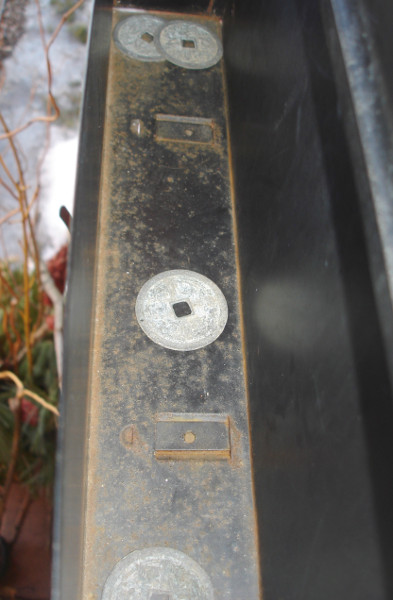
There at the bottom the mailbox were four I Ching coins.
They had nothing to do with me. But I had seen them and could hardly unsee them and if you've read my article relating The Brady Bunch to I Ching, you'll understand the importance of I Ching as a personal roadmap to any impending situation. Like the narrator in Kafka's "Before the Law," these coins had, by whatever gods might be, been placed there for me and me alone.
And if you know the first thing about I Ching, you know that Hexagrams are derived from three coins, not four. And if you know the first thing about traditional Chinese numerology you know that four is the unluckiest single digit number there is; that when fours saturate your world you might as well dive headfirst off a great wall and end it all.
There the malign coins lay, their quadruple and square pupils staring indifferently into my two round and terrified ones. Their number an affront not only to a time-honoured oracle, but to the earliest binary system historians know of. I couldn't walk away from this horror. I needed it to tell me something. I needed an I Ching reading.
How, from so unwholesome a collection, would I select three?
I hit upon a stratagem of chance operation in keeping with the tradition. I closed my eyes, grabbed three of the four coins randomly and threw them six times on the mat in front of the door.
The surroundings in which I'm inspired to throw the I Ching are baffling even to me. I did it once in a sports arena during a tied-up nail-biter of a third period. I share this not to flaunt my shameful disengagement from the proud Canadian pastime, but simply to explain how throwing them on a co-worker's steps is less weird for me than it might seem to an outsider.
Certainly it kills the scenario where I get into and out of my colleague's front yard quickly and without suspicion and, yes, it's an example of why a life of crime would have been a poor career choice for me.
Before throwing the coins one poses a question. I planned to do a photo tour after leaving her house. So, "In revisiting this quotidian journey," I asked the coins, "will I find enlightenment or despair?"
Here, on the mat on my colleague's front steps, I derived the following.
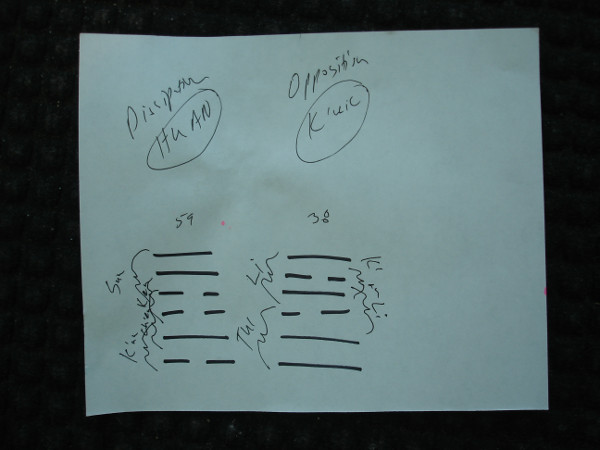
Huan (59) changing to K'uie (38)
Thankfully I keep a copy of Wilhelm/Baynes I Ching in my car and was able to interpret the changes as follows.
Hexagram 59 Huan (Dispersion, Dissolution)
The two primary trigrams give us wind (over) water. Wood is hardened over fire to make oars. K'an, the middle son, constitutes the lower trigram. Here he represents blood [!] but thankfully wind, represented by Sun, the eldest daughter, dissolves it. Occasion for bloodshed is removed. (Whew!) Water ripples and scatters in the winds, taking us from the Way as we paddle our rudely-hewn and precarious little craft. Firmness and correctness are essential here. (This, incidentally, is the parting advice of about 98 percent of the hexagrams.)
In other words, rectitude will help me get upstream with a dubious paddle. It strikes me there's a colloquial aphorism in our culture that takes us through similar waterways.
Still more concerning is the change to Hexagram 38 (Opposition. Fire over water.).
Two daughters, Li (middle daughter, fire) and Tui (youngest daughter, water), occupy the house. Wilhelm/Baynes tell me water and fire don't mingle very when they're stacked up like that (i.e. with the elder daughter above the younger.) I briefly had my daughters sharing a room and sleeping on bunks, and with the elder above the younger (what was I thinking?) and I can tell you that the Li over Tui metaphor is pretty apt.
Where Hexagram 59 represents velocity and movement, Hexagram 38 speaks of a fixed location. If Li and Tui were transposed, fire would rise upward and water flow downward, creating a steamy mess, but at least that's a convergence of energies where each renders the other inert.
But in Hexagram 38, the house burns itself upwards into nothing, at the same time as the basement floods, making even the foundation unsalvageable.
I look at my watch and calculate whether I have time to run home and check the basement to make sure my younger daughter hasn't overloaded the washing machine (it's happened) and then run upstairs to make sure my elder daughter hasn't left the hair-straightener on (ditto).
But there isn't time. I decide instead to read the hexagrams metaphorically and proceed with my photo tour. I make a personal mental note to address any police officers or security guards respectfully, maintaining firmness and correctness throughout my journey.
I retrieve the envelope, avert my eyes as I drop the three coins back with their lone companion, close the lid, and get back in my car, miraculously undiscovered - or at least unquestioned - by neighbours.
On the road I mentally review the results of the hexagrams folded in my shirt pocket. One is about velocity and movement through a perilous environment; the other is about a fixed location in which contrary forces must be disentangled.
As the first hexagram emerges steadily into crisp focus, the second fades steadily out of perception. Always the clarity of one is in proportion to obscurity of the other, with the inverse precision of an uncertainty principle.
Since my plan today is to recreate the walk I used to take 20 years ago from home to work and back, I realize I will grapple with this very problem. If I stop to ruminate on a location and photograph it, I will break the rhythm and lengthen the duration of the journey. Contrariwise, if I try to maintain the velocity of my quotidian journey, as I always did, so as not get written up for failing to be seated at my desk when the 0900 buzzer went (it was pretty old school there) I will neglect locations I want to document.
Observation is fraught with compromises.
From my shirt pocket the folded hexagrams were saying, "Do not to continue with this insane photo tour." No, they weren't saying it. They were screaming it. They were screaming, "You have wandered from the Way already. We implore you to resist chaotic urges. We implore you to observe firm and correct behaviour and proceed directly to work!"
An observation about Tui - the lower trigram of 38 - reverberated with particular shrillness. According to Wilhelm/Baynes she represents 'Metal,' 'Killing,' and specifically 'The West' (whence barbarians seem to come from in all civilizations.)
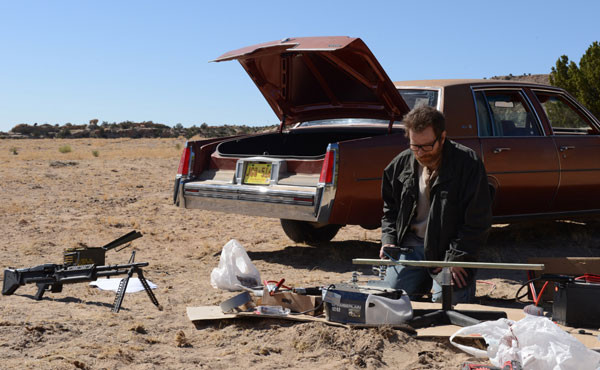
But I succumbed to the dark side. I didn't go to work. I drove to the location of my earliest days in Hamilton. The house where my first daughter was born.
Oh, and if the four coins weren't enough to put my day into a tailspin, I found this on the ground beside the car when I stopped for gas.
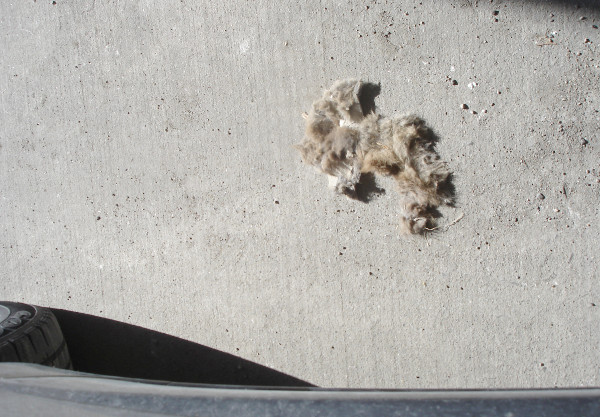
That's right. The last chewed remnants of an unidentifiable animal. Bad luck in the extreme for whatever it once was and an ominous enough sign for me. Perhaps it was wishful thinking but an affirmative meaning emerged as the eyes of my imagination morphed it
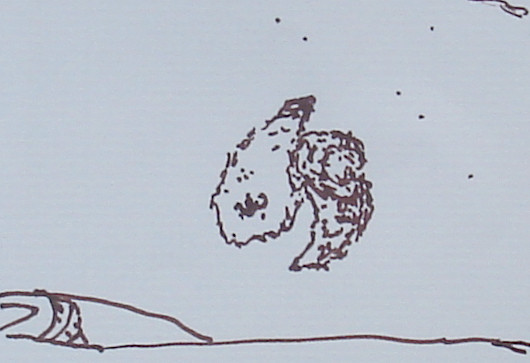
into a yin yang symbol, the shapes and shades cuddling into a perfect circle.
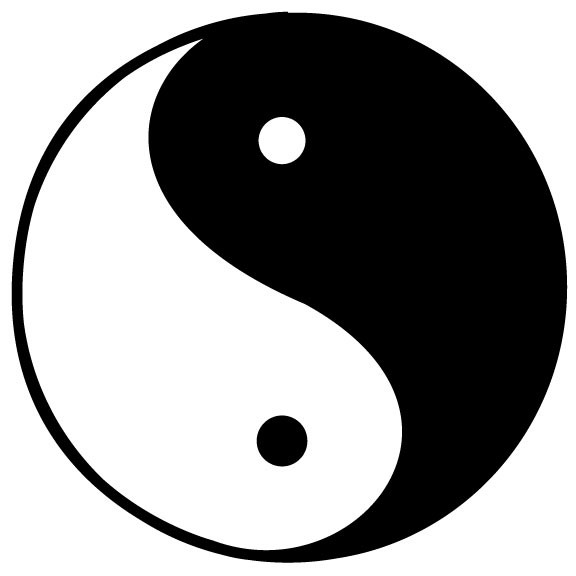
You first saw the light in the room you most likely were conceived in. The big bow window looked west to the mountain. Mainly west. For being bow it looked also a little south and a little north. —Samuel Beckett
The tour begins in front of a house on a cul-de-sac north of King Street East
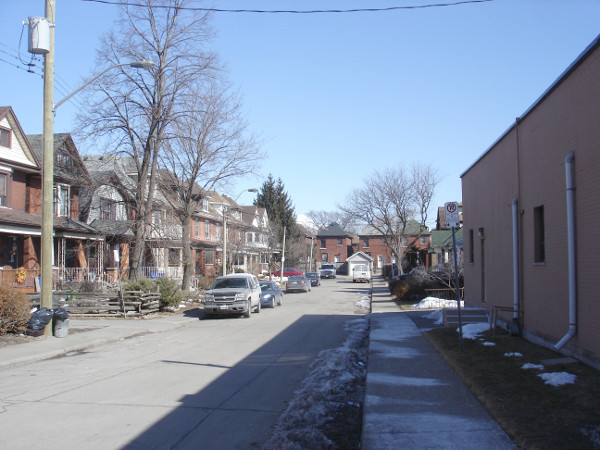
where we rented the second floor and where my eldest daughter was born at 12:45 AM on a hot July 4 night in the bedroom whose bow window you see on the right.
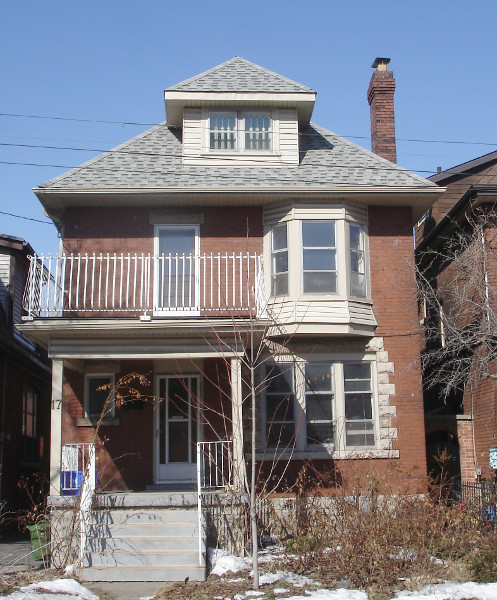
The passage from Beckett is true in generalities and false in particulars. Given the hour, she didn't see the light of day. With semi-formed eyes, she largely failed to see the darkness of night.
We had only lived there for three months, so barring the cosmic fluke of a clandestine liaison with an unknown (to me) biological father-information on whom I adamantly don't want-at a location we would later rent, I can assure you this was not the room she was conceived in.
There is a bow window but it faces east. Mainly east. For being bow it looks also a little south (to the mountain) and a little north.
It was during this period that I worked at what was then the head office of what was then the Hamilton Automobile Club (head office has moved and it's now CAA South Central Ontario). To get to work I walked 15 minutes west on King Street and to get home I walked 15 minutes east on King Street.
I last walked it roughly 20 years ago. Notwithstanding the warning of four sinister I Ching coins, a dismal set of changes, and the animal remains, I was determined to walk it again today.
Over breakfast and coffee that morning I'd fired up my Kindle. I find this the best format for reading while ingurgitating. It's compact and easily insinuated into small spaces amongst vessels and plate.
I was devouring the first volume of Karl Ove Knausgaard's six volume personal memoir My Struggle (Min Kamp in Norwegian, which title I'll guess his editor implored him to reconsider).
To my horror it was on this particular morning that my Kindle chose to pack it in! (bad number of coins + conflicted I Ching throw + scary animal remains + Kindle malfunction = four [!] ill omens. Why did I even get out of bed?)
I don't quite understand the inner workings of Kindle-I believe magnets are involved-but text was being obliterated by horizontal threads of black, to the point where certain lines were unreadable.
I was nevertheless determined to continue with my struggle.
A memoir is necessarily about memory and memory is necessarily about loss - a loss that is filled in with imagination. I had lost the better part of two lines per page, being only able to see the bottom third of the letters.
Certain words had to be assumed and in some cases whole phrases had to be replaced in my imagination, such that the book now possessed an ambiguity its author could never have imagined or intended.
Here, for example, where he's discussing the publication of his first novel. And how his idea for the cover is overruled by the publisher's will to maximize sales. Just as his words expressing this conflict are overruled by my Kindle's will for self immolation.

This is a new way of individualizing the reading experience, of forcing collaboration between the reader and the printed text. And since this digression about Knausgaard's first novel is embedded in a long reflection on the death of his father, I couldn't help but make a connection to the death of my Kindle.
Some quick Googling told me that there's no fix. It's simply how Kindles burn down to embers and then die. Traditional books only die when they've changed hands so many times and fallen into such disrepair that we no longer feel they're worth keeping alive, sentencing them finally to the euthanasia of the recycling bin.
E-readers die without our consent and take the whole library with them. This is a turning point in civilization.
The walk I once took from home to work and back is no longer mine. It belongs to larger forces than memory. Some things have been preserved exactly as they were then. Like the King Sherman sauna, whose sign I can picture even twenty years later when I stare at a white wall. If it were up to me this façade would be preserved as long as there's a Hamilton.
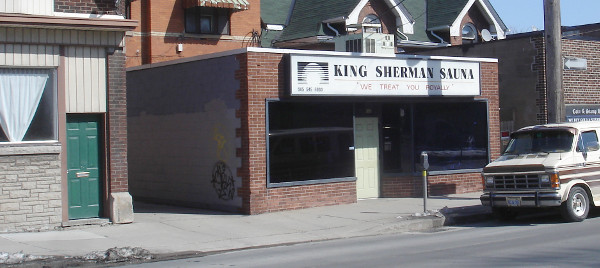
Or the Bates Motel-like BUDGET INN, whose name in concert with its wide sans serif font achieves epic blandness. The repetition of simple rectangles

contains the infinite possibility of a blank Word document. I once longed to write the story of every imagined occupant of every of every imagined room of the BUDGET INN.
And one of my most intense fantasies from this period of sleep deprivation and social isolation was that I would call in sick, dress for work as usual, walk only as far as the BUDGET INN, check in, proceed with my key to Room 17 (as you can see, mine was a well-developed and detailed fantasy) hang my suit carefully in the closet, get into bed, and sleep for eight delicious and uninterrupted hours on sheets that had been laundered within the last month.
Those of you with small children understand this fantasy.
Other locations are extant, but like my Kindle screen, partially erased. Such is Mario's barber shop,
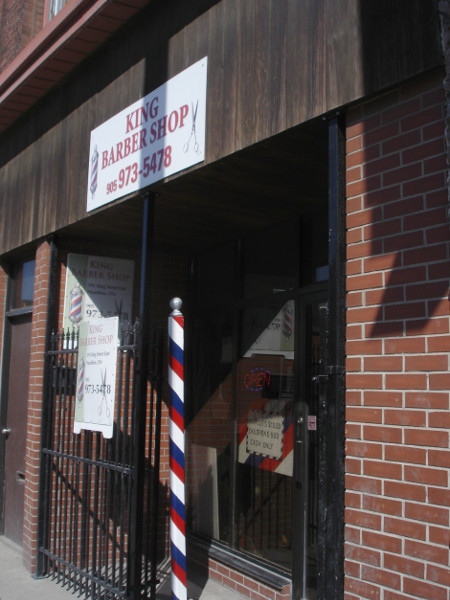
where I would sit and wait my turn in the friendly isolation of being the only non-Italian speaker in the room. Late afternoon light falling on Mario's framed and faded trade-certificate dated the year of my birth, an image of a Venetian canal ghosted behind its elegant lettering.
I'm happy to see that it's still occupied by a barber, but sad it's no longer Mario's. Sad I couldn't just wander in, sit in the chair, and hear Mario speak the familiar words "Same always?" to which I would nod in the affirmative, not entirely sure if he's asking me if I want the same haircut that he's always given me, or if I'm agreeing with the simple assertion that he's going to give me the haircut he's always given me, knowing it to be the best look for me.
Switching rapidly between four straight-razors, Mario sculpted the back and sides of my hair in a matter of seconds, always to perfection and I still have both my ears. The man was a wizard with those things.
I have to cross the street to get a good photo of the strangest event to occur during the time of my pedestrian commute. In so doing I disrupt the flow of my walk. A tradeoff between momentum and documentation that I'm forced to accept.
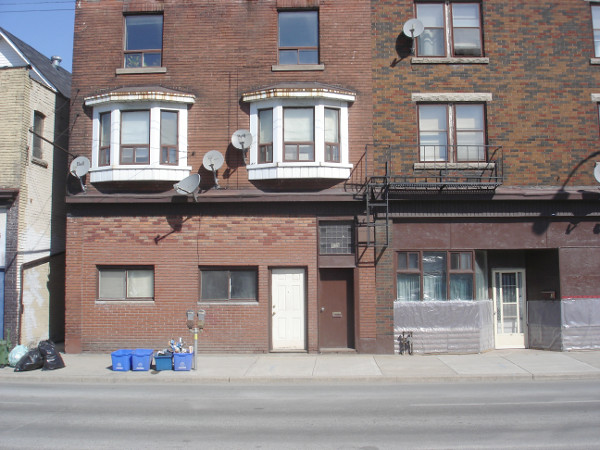
On the day in question I was walking home from the office enjoying the euphoric few moments to myself between work and childcare. I had just had my hair cut at Mario's. It was the 90s and I worked in the service industry and had to wear a suit, so it's probable that on King Street East I didn't exactly blend.
Ahead of me I noticed but didn't particularly examine a woman leaning out of a second floor window. The bow window looked south to the mountain. Mainly South. For being bow it looked also a little west and a little east. Significantly, the bow-ness of it gave her a greater reach over the sidewalk.
She was holding an object I failed to identify before I was under it, but which turned out to be a condom filled with water, and which object exploded on my head (rather impressively given that I was a moving target so I suspect it wasn't her first shot at this.) It not only saturated my new haircut, but soaked my clothing front and back.
To this day I don't know whether it was performance art, an attack on European male privilege - something I no doubt represented despite a pretty meager income - or the most random of mental health moments. These, at least, were the immediate possibilities it occurred to me to question her on. But when I looked upward she'd vanished.
It was a hot summer day. I Ching might described it as water over the fire; changing to fire over water as the condom and it's dissipating fluid (ew) hit the pavement and as my personal and rage-filled gaze rose upward. Had I followed my impulse I'd've entered the building, run up the stairs, and knocked violently on the apartment door to address these and still evolving concerns (e.g. that she please assure me that the condom was unused prior to becoming an engorged weapon [ew2]).
But the impulse was overridden by prudence. What if it was a trap? What if I was being urged into the building to be assaulted by thugs in the shadows? I did, after all, look like a man who might have actual money. I might well be beaten, relieved of my wallet, then beaten more furiously and left for dead when it was discovered I had only ten dollars and a library card in it.
So I continued home like a mangy dog sprayed with a hose while scrounging in an alley. In writing it up I find I have no residual anger around the incident. A dish of revenge taken so cold as to be flavourless. That I'm making a big deal of an attack this trivial speaks further of my comfortable male European life so far. What a tepid, wet, conflicted, political mess.
Just past King and Tisdale is where I would normally turn towards my old workplace at 393 Main Street East. The building was abandoned for operations shortly after I left in the mid-90s. To the best of my knowledge it's been unoccupied for most of the last two decades.
My hexagrams don't bode well for what I am going to see there. The bad vibe of drifting from the Way in Hexagram 59 followed by the domestic disharmony in Hexagram 38, forces my mind [EFFECTIVE IMMEDIATELY: EXTREME SPOILER ALERT FOR Breaking Bad ENTHUSIASTS IN MEDIA RES] to Season Five Episode Nine of Breaking Bad, which we will learn in subsequent episodes, is a flash forward to the final day of Walter White's career as a methamphetamine producing badass.
Cryptic low angle shot of skateboarders. Then a birds-eye establishing shot indentifying skaters in an emptied swimming pool. We watch Walter White parking his car, stepping onto the street, and slamming the door behind him as he looks around for neighbours he doesn't want to have to explain himself to.
He takes a tire iron from the trunk and uses it to break through the chain-link fence delimiting the condemned property of his former home. He walks up the steps and uses the aforementioned tool to break through his front door. (Li and Tui are in pretty intense disharmony here! And I thought my Hexegram 38 defined home was bad!)
In addition to commandeering his pool, vandals have destroyed the interior. Right down to painting Walter White's street name on the living room wall.
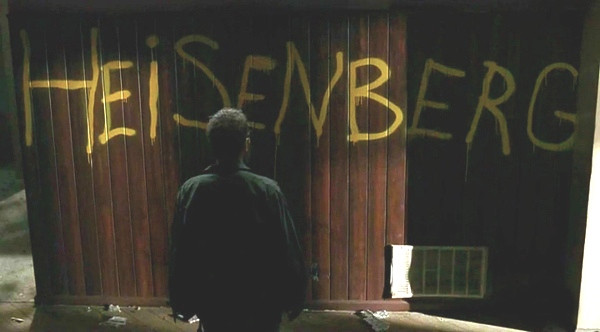
Though I'm not vain enough to think that MARK FENTON PHOTO-ESSAYIST will be spray-painted on the walls of the lunchroom, I do fear that vandals will have taken over the old Auto Club in a similar manner.
But when I reach the property I find that the decay is milder than expected, and rather than Season Five of Breaking Bad, the reference is to Season One of The Wire. The courtyard of the low rises where D'Angelo Barksdale moves product.
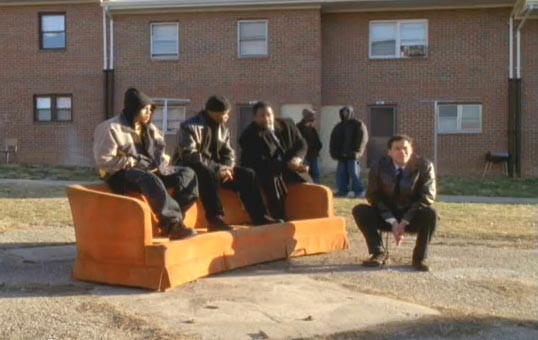
Having, as Hexagram 59 warns me, wandered from the Way, I am thankful to whatever gods might be that the territory is unoccupied. That I will not be killed for stumbling into narcotics commerce.

I'd like to attribute my survival to firmness of conduct but I know that it's just dumb luck.
Looking past the petrified snow

I have a clear view through the negative space of the magisterial parking lot. The building itself hasn't changed much. Through the back window I can all but see myself hard at work on a photo essay while pretending to work on copy for the magazine.
I continued past the building to the strip mall in the next block and I'm sure glad I did.
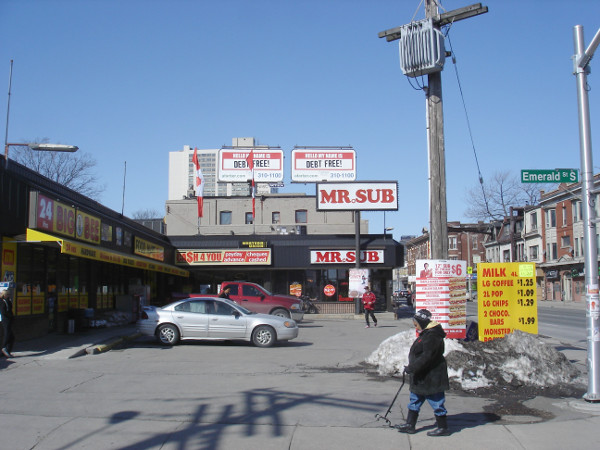
One's national pride surges at the Canadianness of this scene. All those reds and whites. Right down to Maple baked Ham (see two images below). I love how the Debt Free billboard doubles itself like a Warhol design, and how perfect that there's a doubled Canadian flag in front of the doubled billboard. To say nothing of the street level Mr. Sub sign that's also red and white and has the Warhol effect
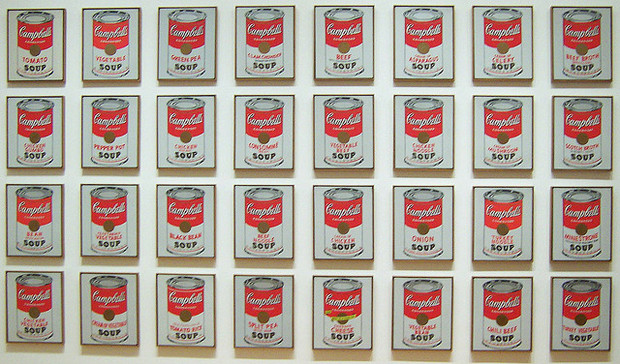
gone crazy
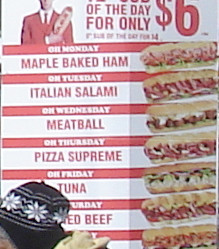
What is now a cheque cashing place was then an adult's only VHS rental place. One lunch-hour curiosity got the better of me and I entered it to be oriented immediately by a gentleman who spoke with the whispered delicacy of a health care professional addressing a patient's fears about an impending colonoscopy. We were the only two people in the room.
I thanked him with what I hope got heard as sincerity and browsed for the minimum time etiquette allowed. He stood near me in something resembling a tai chi commencement stance, and bore an expression I can only describe as beatific.
I recall videos being organized by predilections for specific practices and combinations. For reasons both obvious and nuanced it summoned up and amplified my recent experience of being condomed [ewWUH!]. Moronically, I thanked him a second time and fled the establishment never to return.
Thinking back to my Kindle (which as of writing this section is as done as Walter White's meth career, just like on-line users told me it would be) I realize I'll never know how Volume One of My Struggle ends. But that's real life. All journeys involve digression, lacunae, things just broken off.
Contrary to my plan, I didn't return to the car by the route I always took home at 1700. Instead I headed north on Emerald to Cannon and walked east all the way to the new stadium which, given my level of engagement with professional sports mentioned above, has little bearing on memories of living in this neighbourhood.
Back before it was a done deal I read a lot of the Raise the Hammer pieces on botched possibilities for a better location. So I know the general consensus is that it's sort of the same structure in the same location just turned sideways.

While I won't go so far as to praise the outcome, in a small way I find something satisfying to my own picture of Hamilton where even the newness is embedded in the unchanging. To the question I asked the coins, I can say emphatically that the journey brought enlightenment and despair in equal measure.
When I got into work I called my co-worker and confessed to snooping in her mailbox and asked her what in the name of whatever gods might be was she thinking in putting four I Ching coins in her mailbox. She told me they'd initially sat under the doormat on which I threw them. They'd been given to her by a friend for good luck.
!!!
I cautioned her strongly to keep three, not four, coins there in the future and just watch her luck improve.
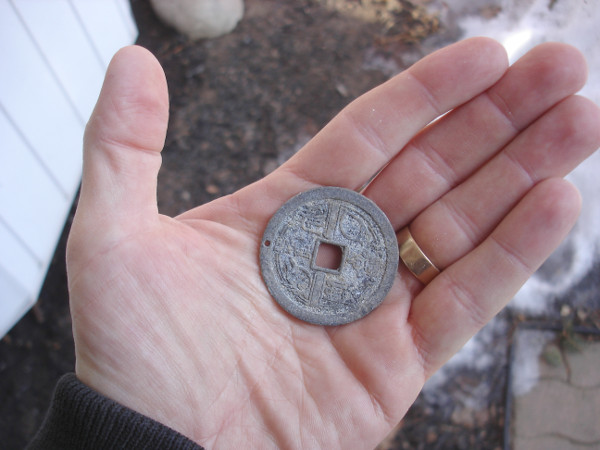
You must be logged in to comment.
There are no upcoming events right now.
Why not post one?